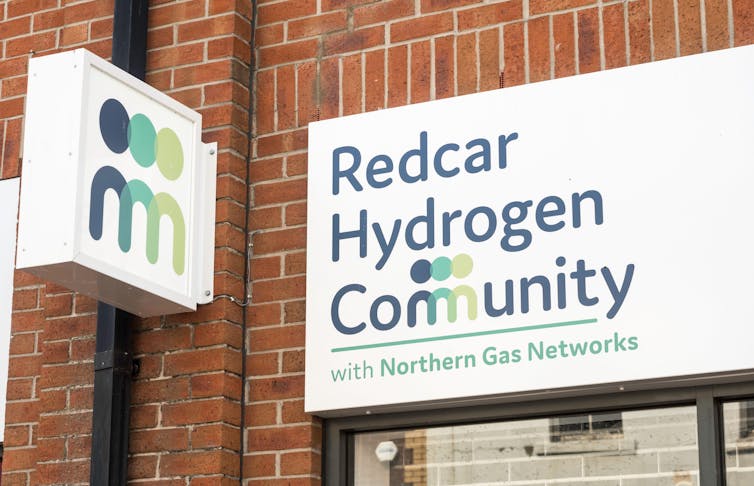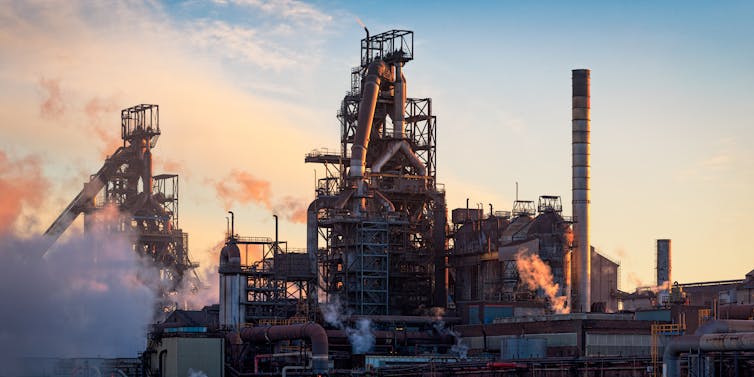[ad_1]
Boilers will probably be banned in new-build houses within the UK from 2025, in response to a long-awaited authorities session on power effectivity requirements within the housebuilding trade. The report stated that there’s “no sensible manner” that putting in boilers of any kind will “ship vital carbon financial savings and ‘zero-carbon prepared’ houses”.
What’s extra shocking is that hydrogen has additionally been dominated out as a possible heating supply. Beforehand, hydrogen had been touted by each the federal government and the power trade as a logical alternative for the pure fuel (a fossil gasoline and contributor to local weather change) that’s pumped via the nationwide grid and burned in boilers all through the UK.
Offered it’s made with out emitting carbon, sometimes by utilizing renewable electrical energy to separate water molecules, hydrogen is a “clear” gasoline. However the overwhelming majority of the hydrogen used worldwide is produced utilizing fossil fuels, making it a doubtful inexperienced different.
A report in March 2023 by a UK authorities advisor advisable mixing as much as 20% hydrogen into the fuel grid. Among the greatest boiler producers referred to as for “all boilers to be hydrogen-compatible as of 2025”. And, as just lately as December 2022, the federal government thought of making all fuel boilers offered to houses from 2026 able to someday burning hydrogen as an alternative.
Three cities, Whitby in Cheshire, Redcar in North Yorkshire and Levenmouth in Fife, had been even chosen to host trials the place a number of houses can be heated with hydrogen.

Washington Imaging / Alamy Inventory Photograph
Outdoors of the bubble inflated by the federal government and trade figures, few thought that utilizing hydrogen for residence heating was a good suggestion. Hydrogen received’t resolve both of the 2 greatest power challenges: price and carbon emissions. The method of creating hydrogen is considerably costlier than pumping pure fuel and there merely is just not sufficient “clear” hydrogen obtainable.
A 2022 report by Dr Jan Rosenow from the College of Oxford reviewed 32 worldwide research on the usage of hydrogen for heating and concluded that its widespread use was not justifiable. “Hydrogen use for home heating is much less financial, much less environment friendly, extra useful resource intensive, and related to bigger environmental impacts” than options reminiscent of warmth pumps, it stated.
Warmth pumps are quickly changing into the default alternative for heating (and cooling) globally. Utilizing the identical expertise as a fridge or air conditioner, warmth pumps powered by electrical energy extract and switch warmth to the place it’s wanted.
Did COP28 burst hydrogen’s bubble?
The timing of the session is intriguing. It was initially scheduled to be revealed in late 2020 however was postponed a number of instances. It was lastly launched on December 13 2023, on the identical day that just about 200 international locations agreed to “transition” away from fossil fuels on the COP28 local weather summit in Dubai.
Just a few days previous to this on December 8, a broad vary of presidency, trade and voluntary organisations launched a joint declaration at COP28 on the Accountable Deployment of Renewables-Primarily based Hydrogen.
The declaration features a pledge to prioritise clear hydrogen for “displacing the present use of fossil-based hydrogen” the place loads is already wanted, or for “hard-to-abate sectors” reminiscent of heavy trade the place much more will probably be wanted. It went on to state that its use for heating can be “probably cannibalising renewable electrical energy”. It’s because you find yourself with solely two-thirds of the power within the hydrogen that you simply began with from the electrical energy.
As for the three trial tasks, two have already been cancelled because of protests and an absence of uptake by residents. It’s arduous to see how the one remaining in Fife may sensibly proceed – particularly because the Scottish authorities signed the Accountable Hydrogen declaration.

Chris Goddard/Shutterstock
What the longer term holds
That is only a session. In different phrases, a authorities coverage doc submitted for public suggestions. There isn’t any assure that the ban on hydrogen boilers will probably be applied by parliament. It’s possible that power trade teams will foyer for adjustments via the session course of, and finally it will likely be the politicians who determine.
However the course of journey has been set. That is “the start of the tip” of the fossil gasoline period in response to the UN Local weather Change Govt Secretary Simon Stiell in his closing speech at COP28.
Germany’s local weather envoy Jennifer Morgan stated: “Now the alerts are clear. When you’re an investor, the longer term is renewable. Fossil fuels are stranded property.” Clear hydrogen will probably be part of that transition however solely the place no viable options exist.
No matter whether or not the suggestions of the Future Houses session turn into regulation, we are able to safely say a couple of issues:
Hydrogen won’t be used for residence heating in any significant manner. Even when the federal government ignores the session, there may be neither scientific nor public assist for its use and it’ll not cut back power prices.
Assume that each one new-build houses will probably be fitted with warmth pumps beginning inside the subsequent few years. The truth is they’re cost-effective to put in and function, particularly as insulation ranges are elevated such that the necessity for area heating turns into minimal.
The one actual different to warmth pumps, particularly for residences, are district warmth networks the place sizzling water will get pumped round an entire neighbourhood from a central supply. These are commonplace in lots of chilly international locations, so we should always anticipate to see much more of them within the UK.
The opposite certainty is that residence boilers will very quickly transfer into the realm of nostalgia.
[ad_2]
Source link

